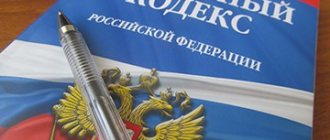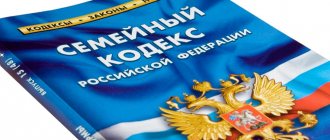Who is considered a close relative according to the Russian Family Code?
Article 14 of the RF IC states that close relatives are blood relatives in one generation, across a generation and in neighboring generations. In simple terms, in family law, close relatives are parents, children, grandparents, grandchildren, brothers and sisters (full and half-blood).
It is noteworthy that according to the Family Code, a husband and wife are not close relatives , since they are not related by blood.
Spouses are recognized as family members in accordance with Article 2 of the same Family Code. However, an officially registered marriage, by law, is considered a special type of relationship. Therefore, despite the lack of family ties, husband and wife have some privileges. For example, if one of the spouses died without leaving a will, then the second is the heir of the first priority, like close relatives.
Are they close relatives.....
This phrase often begins the questions that people ask lawyers when certain legal situations arise. Let's take a closer look at the different degrees of kinship to give a clear picture of who is a close relative, who is not, and when the question should be asked differently.
Husband and wife
From the point of view of at least half of the legislative acts, husband and wife are not close relatives to each other. Because there is no blood relationship between them. For them, the RF IC provides a special status - “family member” (Article No. 2). The Housing Code of the Russian Federation defines spouses (though not only them) in the same way.
The union of a man and a woman, officially confirmed by a marriage certificate, does not make them close relatives, but gives a number of privileges, at least equal to the privileges of close relatives.
For example:
- Spouses are included in the first priority of inheritance, along with their closest blood relatives
- Spouses have equal rights to close relatives in all legal spheres
- Spouses own common property in equal shares, regardless of which of them specifically acquired it. And they can divide it among themselves at any time
And, nevertheless, the concepts of “spouses” and “close relatives” are essentially opposite. After all, close relatives do not have the legal right to marry each other. So the correct answer to the question: “Are spouses close relatives?” should sound like this. “No, they are not, but that doesn’t matter, because in the eyes of the law, they have all the rights of close relatives.”
Former spouses
No. They were never close relatives, and after the divorce they lost their marital status, and with it all the privileges of a “family member.” Even if the spouses did not end their actual relationship after the divorce, or divorced, and then “changed their minds” and got back together, but did not register the marriage again, the former spouse does not have any rights.
Grandmother
Yes, grandmother is included in the list of close relatives in all legislative acts. With the exception of the Housing Code of the Russian Federation.
Grandfather
Like a grandmother, a grandfather is a close relative to his grandchildren.
Grandchildren
Accordingly, grandchildren are also close relatives of their grandparents. Moreover, even if the parents divorced, the grandson will not cease to be a close relative of his grandparents, both on the father’s side and on the maternal side. Whoever he ends up living with after the divorce.
Mother in law
The mother-in-law is not related to the daughter-in-law, the mother-in-law is not related to the son-in-law. Although for their children both of them will be a close relative - a grandmother. In relation to the spouses of their own children, parents are only relatives (brothers-in-law). The law includes stepmothers and stepfathers, stepsons and stepdaughters in the same category.
But if the latter are at least included in the last line of inheritance, then in relation to fathers-in-law and fathers-in-law, the law does not see any connection. With the exception of the Housing Code of the Russian Federation. The number of “family members” living in the same living space may include a mother-in-law or mother-in-law.
Brother or sister
Yes, these are close relatives, regardless of whether they both have the same parents or not
Cousin or brother
No, cousins are not considered close relatives from the point of view of the law. In fact, they are not even included in the inheritance queues. Cousins inherit from each other only by right of representation - instead of their parents who died before the testator.
Brother's wife or wife's brother
In everyday life, people can communicate closely with their spouses’ siblings, become friends, and even consider them “relatives.” But from the point of view of the law, this is only a remote property that is not mentioned in any legislative act. With the possible exception of the Housing Code of the Russian Federation, which is ready to recognize as a “family member” anyone living in the owner’s apartment.
If you still have questions related to the legislative interpretation of the concept of “close relatives,” you can seek advice from the lawyers of the Prav.io portal.
Close relatives in other areas of law.
The Family Code is the main legislative act that determines who is a relative. However, in other codes and areas of legislation, the definition of close relatives may include not only those mentioned in the Family Code of the Russian Federation.
For example, according to paragraph 4 of Article 5 of the Code of Criminal Procedure, close relatives of a citizen are his spouse, parents, brothers and sisters, grandparents and grandchildren. Also, close relatives in the Criminal Procedure Code may include adoptive parents and children. That is, in this case, consanguinity does not have the same meaning as for the Family Code.
Article 25.6 of the Code of Administrative Offenses states that close relatives are all those relatives specified in Article 14 of the Family Code, as well as adoptive parents or adopted children.
As for Tax legislation, in which there is a serious need to determine which relatives are close and which are family members (for example, when determining tax benefits), the Tax Code in this matter refers to the Family Code of the Russian Federation.
The concept of close relatives does not apply
Determination of family ties
| No. | Attitude towards the deceased | Presence/absence of family ties |
| 1 | Persons who are related due to blood ties, but are not included in the number of close relatives | This group includes cousins. That is, the descendants of the brothers/sisters of a particular citizen. These are also great-grandparents and great-grandchildren. As well as uncles/aunts, nephews/nieces. |
| 2 | Persons who are relatives of the spouse | Due to the lack of blood ties, such citizens are not included in the family. Father-in-law/mother-in-law, father-in-law/mother-in-law, son-in-law/daughter-in-law are not relatives. But they are such to one of the spouses. For example, a father-in-law is the father of a wife in relation to her husband. |
| 3 | Persons who perform the functions of relatives, but are not legally such | Guardians/wardees actually replicate the relationship between parents and children. Common-law spouses are in a de facto marital relationship, but are legally cohabitants. There are no family ties between the listed citizens. However, it may appear as a result of formalizing the relationship. A guardian can adopt a ward and equate him to a natural child. Common-law spouses can register their marriage. |
Are adopted children close relatives?
The Family Code does not recognize adoptive parents and those adopted by close relatives for the same reason of lack of consanguinity. However, there is an exception to this rule. For example, if a man marries a woman who has a child and adopts him, that is, the name of this man is recorded in the “father” column on the child’s birth certificate, then they will be considered close relatives to each other. If he remains in the status of a stepfather, then there can be no talk of kinship. Children adopted from an orphanage will not be defined as close relatives.
However, according to Article 137 of the Family Code, despite the lack of kinship with the adoptive parent, adopted children will have all the same personal and property rights and obligations in relation to adoptive parents as natural children.
That is, despite the fact that there is no family connection between the adoptive parents and the children, he will have all the same rights as close relatives.
Who is not closely related?
There are categories of citizens who are not close relatives of each other. They can only be so in relation to one of the spouses. This list includes:
- cousins/brothers;
- great-grandparents and great-granddaughters/great-grandchildren;
- aunts/uncles and nieces/nephews;
- daughter-in-law/son-in-law, father-in-law/mother-in-law;
- mother-in-law/father-in-law.
By the way! In a civil marriage, the man and woman are not related. They have no right of inheritance. The only exception can be a will.
Mother and son, being the closest relatives, inherit property after each other. After the son’s marriage, the mother-in-law and daughter-in-law will not be related, so there is no right of inheritance between them.
Often, ignorance of the law leads to serious mistakes. Spouses are family members, but not relatives. After a divorce, all ties are broken. For example, a husband gives his wife an expensive gift at the time of marriage (real estate, shares, a car). According to clause 18.1 of Art. 217 of the Tax Code of the Russian Federation, the recipient does not pay personal income tax in the amount of 13% from close relatives or family members. If at the time the wife files her income tax return they are divorced, then this gift is not taxed. Confirmation - marriage certificate at the time of gift delivery and divorce document. All certificates must be attached to the income tax return.
Inheritance by close relatives.
One of the main reasons why you may be interested in issues related to family ties is inheritance. When considering this issue, you need to refer to Article 1142 of the Civil Code of Russia. It says that the heirs of the first priority are the children, spouses and parents of the deceased. The heirs of the second stage are the testator's brothers/sisters, as well as grandparents.
Thus, it turns out that spouses, not being close relatives, fall into the category of first-line heirs, while many relatives who are considered close are not direct heirs.
Sources:
RF IC Article 137. Legal consequences of adopting a child
RF IC Article 14. Circumstances preventing marriage
Code of Administrative Offenses of the Russian Federation Article 25.6. Witness
Code of Criminal Procedure of the Russian Federation Article 5. Basic concepts used in this Code
Members of the owner’s family: who they are according to the law and how this affects the payment of housing and communal services
Different dictionaries interpret the meaning of the word “family” in approximately the same way – it is “a group of close relatives living together.” In our understanding, family is all the people we love, value, and care about. However, at present, the legal and social meaning of the concept of “family” is different. As a rule, to resolve various disputes, represent interests, and even charge housing and communal services, the legal interpretation of the word “family” is used. This is why it is important to know the exact definition of this term. To figure out who is a family member, let’s study the legal norms.
The Code on Marriage and Family of the Republic of Belarus defines a family as “an association of persons connected by moral and material community and support.” In the family, all members manage the household and raise children. Everyone has their own rights and responsibilities.
In housing legislation, the concept of “family members” is most often used when calculating housing and communal services, issuing subsidies for utility bills, as well as when registering those in need of improved housing conditions, etc.
Therefore, the Housing Code of the Republic of Belarus expands this concept to “family members of the home owner (tenant; subtenant; citizen who is a member of a developer organization).”
WHO CAN BE A FAMILY MEMBER?
Unconditional family members of the owner
(it is possible to live both together and at different registration addresses) are: spouse; parents; children; adoptive parents and adopted children.
Family members of the owner when living together with him
siblings, grandparents, and grandchildren will also be considered. In this case, they are united by common management and registration under one roof. If they live at different addresses, they are not legally recognized as family members. That is, they naturally continue to consider themselves as such (to take care of each other, to support each other financially), but they will not be able to use this right when preparing documents or representing their interests in resolving certain issues.
For example, the most common situation is when a loving grandmother decides to give her home to her grandchildren, who either live (registered) in other apartments or are the owners of other homes. The deed of gift is drawn up, the grandson or granddaughter becomes the owner of the property, and the grandmother remains to live in the apartment as a registered relative. However, by donating the property, she is deprived of some benefits when paying for housing and communal services. So, if the owner and members of his family are not registered in the apartment (in this case, the grandmother is not legally a family member), heating, water heating, electricity and gas services will be calculated at economically reasonable rates.
At subsidized rates, the grandmother will pay for maintenance (since she is a pensioner living alone), water and sewerage (since she is registered in the apartment and is a utility payer).
If you don’t know these nuances, heavier fat can become an unpleasant surprise for a pensioner. In this case, there are two options to retain the right to pay for housing and communal services at subsidized rates. First: register (permanently) in the living space for a grandson or granddaughter (now the owner of the property) - the grandmother legally becomes a member of the owner’s family. Secondly, the new homeowner enters into a rental agreement with the grandmother and registers it with the tax service with the note “renting the apartment to a close relative.”
The owner of a residential premises and his family members are jointly and severally liable for obligations related to the ownership and use of residential premises, payment of housing and communal services
Other relatives of the homeowners
, relatives, disabled citizens, and in exceptional cases, other persons can also be recognized as family members if they live together and run a common household.
This can be done in two ways. The first is to conclude a written agreement on recognition as family members with the executive committee at the place of residence. To do this, you need documents confirming family ties, for example, a birth certificate, etc., as well as the consent of the property owner. The written agreement is drawn up in any form (like a regular application) and must be registered by a representative of the local government authority.
Citizens who are not considered relatives of the homeowner
, can also be defined as family members. Most often this happens when the homeowner himself has settled them. Non-relatives can only receive such recognition through the courts. The necessary condition here is living together and running a common household under one roof for at least five years. Cohabitation is confirmed by registration, housing papers, written evidence and certificates, and other documents.
A statement of claim for recognition as a family member is submitted to the district (city) court at the place of residence.
It should also be noted that the owner of a residential premises and his family members are jointly and severally liable for obligations related to the ownership and use of residential premises and payment of housing and communal services.
For information
Calculation at economically justified tariffs for maintenance (regardless of the size of the total area), heating, water heating, electricity and gas supply is made if:
- a citizen (owner; tenant; subtenant; tenant; member of a developer organization; shareholder who has entered into an agreement providing for the transfer to him of ownership and use of a shared construction project) or members of his family are NOT REGISTERED in the residential premises at the place of residence;
- a citizen owns and (or) has possession and use of non-residential premises in a residential building;
- residential premises are rented out for short-term accommodation (provision of residential premises under two or more rental agreements, sublease of residential premises concluded in a calendar year, the duration of each of which does not exceed 15 days);
- a private unitary enterprise is registered in the residential premises.
Water supply and sewerage services, in the presence of the above grounds, will also be paid at economically justified tariffs, with one exception: if any citizen is registered in the apartment - even not a member of the owner's family - he will pay for water at subsidized tariffs.
If a working-age citizen does not work, then he will also pay for water heating (from January 1, 2021) and heating (from October 1, 2021) at economic rates. If he does not live alone, then only his part of the housing and communal services is paid at full cost.
Yana Shchuka, Community Literacy Portal
What rights does the in-law have?
Since family and civil law do not generally regulate property relations, acts of family and civil law do not contain references to the range of rights that property owners have in legal relations.
Guarantee of impartiality of the court
The main task of Russian legal proceedings is, first of all, a fair and timely decision on the case. This is only possible with impartial and objective consideration of civil cases by judges. In order to implement the above, every citizen has a guarantee - the right to protection of his rights and interests in court, their equality before the court.
The judge cannot be a relative or relative of one of the defendants.
Reasons for the emergence of family ties
A family relationship arises on the basis of:
- Consanguinity – based on biological descent from each other, which is confirmed by a birth certificate (children and parents, grandmothers and grandchildren, other relatives, where the relationship from one person to another can be traced).
- Court decisions – adoption of children. At the request of the adoptive parents, the court may decide to register the adoptive parents as the parents of the child they have adopted. Adopted children in relation to their adoptive parents and vice versa are equal in rights and responsibilities to relatives by origin.
- Remarriage is the relationship between children from previous marriages and the new spouse (stepson, stepdaughter and stepfather, stepmother).
The fact of a family connection must be documented in order to take advantage of the right or benefits established by legislative acts.
Confirmation or refutation of a close family relationship may be required:
- upon marriage;
- in the legal regulation of parental rights (deprivation or restriction);
- when paying taxes and state duties upon gift or inheritance;
- during employment, in cases of direct subordination or control.
Family ties during inheritance
The testator, at his own discretion, has the right:
- bequeath property to any persons;
- determine the shares of heirs;
- disinherit heirs by law without specifying reasons;
- revoke and change a will.
Article 1149 of the Civil Code of the Russian Federation establishes the right to an obligatory share in the inheritance for the following category of relatives and dependents:
- minor or disabled children of the testator;
- disabled spouse and parents;
- disabled dependents.
This category of relatives inherits, regardless of the contents of the will, at least half of the share that would be due to each of them if inherited by law.
The amount of state duty for performing notarial acts
The amount of the state duty for issuing a certificate of the right to inheritance by law and by will depends on the degree of relationship between the testator and the heirs (Article 333.24 of the Tax Code of the Russian Federation):
- children (natural and adopted), spouse, parents, full brothers and sisters pay 0.3 percent of the value of the inherited property, but not more than 100,000 rubles;
- other heirs pay 0.6 percent of the value of the inherited property, but not more than 1,000,000 rubles.
Documentary confirmation of the relationship with the testator is necessary.
Owner: who is this?
Usually in colloquial speech, in everyday life, we understand the words “brother-in-law” or “in-law” as a relative of the wife/husband. That is, this person is not a blood relative to us, but by virtue of marriage he is a member of our family.
In jurisprudence, a relative is none other than the relatives of one of the spouses for the other spouse. This definition is based on the concept of “property”, which is enshrined in family law as “the relationship between the relatives of each spouse.” Thus, property relations arise as a result of marriage.
According to Letter of the Ministry of Finance of the Russian Federation dated June 6, 2013 N 03-04-05/20968, not only those relations that arise between the spouse and the relatives of the second spouse, but also the relations directly between the relatives of the spouses themselves can be classified as characteristic. That is, drawing conclusions from the above, we can talk about the existence of a two-parent (inherent connection between one of the spouses and the relatives of the other) and three-parent (connection between the relatives of the spouses) properties.
In-laws in family law
In family law, the concept of in-laws came from Roman law, which, as is known, became the basis for the formation of the main institutions of civil and family law not only in the Russian Federation, but also in many post-Soviet countries.
It is possible that property relations existed long before the introduction of this concept in Roman law, or it could have appeared independently of it due to the natural rapprochement of the spouses’ relatives with each other.
However, it was Roman law that brought these everyday relations to the level of assigned rights and obligations of relatives, that is, it determined a unique legal institution.
As a general rule, family law does not regulate the relations of relatives among themselves. There are only certain exceptions.
Such an exception is the relationship between a stepdaughter/stepson and a stepfather/stepmother, when, under certain circumstances, the former are obliged to pay alimony.
However, property relations still have a certain significance for jurisprudence, in particular family law. This concerns the ban on marriages between persons who are related to a certain degree. Although property relations do not influence the possibility of marriage as much as kinship relations, there are certain restrictions.
Thus, marriages between relatives are prohibited only up to the fourth line inclusive. That is, we can consider marriage between: husband - wife's mother, wife - husband's father, stepfather - stepdaughter to be unacceptable.
This is impossible from a moral and ethical point of view. In such situations, the main difficulty may be the possibility of social adaptation of children, since it would be quite difficult for them to come to terms with and get used to the redistribution of roles within the family.
It should also be noted that the corresponding relationship between relatives does not end after the dissolution of the marriage that became the basis for the formation of this relationship.
In addition, certain restrictions exist for individual cases. For example, a judge is obliged to recuse himself if property relations may affect the objectivity and impartiality of his decision.
Based on the above, the question may arise as to whether the relationship between husband and wife is one between in-laws. However, according to family law, marriage is the basis for a special kind of legal relationship, which excludes the possibility of considering a husband and wife as in-laws.







